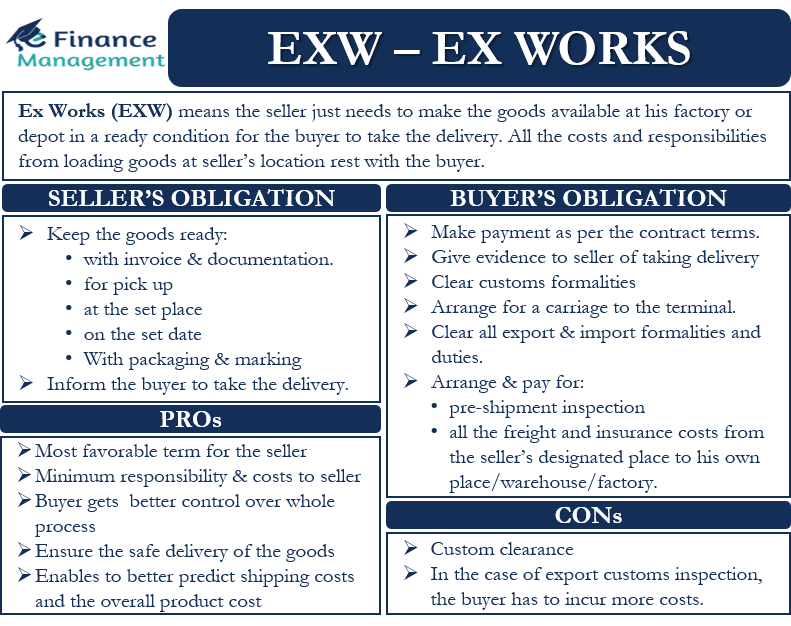EXW, short for “Ex Works,” is the term that one would come across in international trade. It is one of the Incoterms (International Commercial Terms), which helps to facilitate international trade. Like other Incoterms, EXW Ex Works is a shipping agreement that establishes the responsibilities of the buyer and seller. This also indicates the cost of transport and insurance etc., will be borne by whom. However, unlike other Incoterms, this term puts minimum responsibility on the seller. The same terminology is used in domestic trade also and conveys the same meaning for domestic transactions too.
If the contract between the buyer and seller is EXW Ex Works, it means the seller just needs to make the goods available at his agreed place. The place is usually the seller’s factory or depot. The goods, however, must be suitably packaged and in a ready condition for the buyer to take the delivery.
All the costs and responsibilities after that (i.e., from loading goods at the seller’s location) rest with the buyer. And, even if the seller loads the goods onto the carrier, the risk (and cost) rests with the buyer only, but such things must be made clear in the contract. And, if the buyer wants the seller to take care of the export processes and procedures, then the two parties should use FCA (the free carrier) and not EXW.
In normal circumstances, the seller does help the buyer with regard to export documentation and clearances. Of course, the costs need to be borne by the buyer.
Obligations under EXW Ex Works
Seller’s Obligations
Following are the seller’s obligations under EXW Ex Works:
- Keep the goods ready with invoices and documentation.
- Keep the goods ready for pick up at the set place and on the set date.
- Packaging and marking of the items should be export ready.
- Inform the buyer to take the delivery.

Buyer’s Obligation
Following are the obligations of the buyer under EXW:
- Make payment for the goods as per the contract terms.
- Give evidence to the seller of taking delivery of the goods.
- Load the goods onto the carrier from the set place and pay the loading charges.
- Clear customs formalities, as well as get export/import licenses.
- Arrange for a carriage to the terminal.
- Loading onto the main carriage and taking care of discharge and onward carriage.
- Clear all export and import formalities and duties.
- Arrange, as well as pay for pre-shipment inspection.
- Arrange and pay for all the freight and insurance costs from the seller’s designated place to his own place/warehouse/factory.
Pros and Cons of EXW Ex Works
EXW is the simplest and the most favorable term for the seller. The advantage for the seller is that they have to bear minimum responsibilities and costs. And that only up to the delivery of the goods to the buyer at his choicest place.
While it looks most favorable to the seller, the buyer may have its own advantages too. Since the buyer has the shipping responsibility, they get better control over the whole process to ensure the safe delivery of the goods. For instance, the buyer can pick the transport they prefer. Also, it enables to better predict the shipping costs and the overall product cost. Secondly, the buyer may be able to better negotiate freight and insurance costs directly and do not depend upon the seller’s choice, which may be costly.
For example, Company A sells a mobile for $100 with a shipping cost of $50. To save cost, Company B finds a carrier that would pick up the mobile from Company A’s location and deliver it to Company B at $30. This way, Company B will save $20 by going for EXW.
Coming to drawbacks, one major for the buyer is regarding custom clearance. Even in EXW, the seller has to facilitate paperwork for export clearance. If the details from the seller are inaccurate, it could result in delay and additional cost for the buyer. Additionally, in the case of export customs inspection, the buyer has to incur more costs.
Also, in the case of EXW, the buyer would have to find a freight forwarder who can provide the door-to-door service and help with clearing the custom processes.
EXW Ex Works is also not preferable because of custom rules in some countries. For instance, In the EU (European Union), a non-resident individual or corporation can not do the export declaration documents. So, a foreign buyer in the EU with an EXW contract could face a lot of challenges. In such instances, however, the buyer should go for FCA. In this, the seller has to transport the items to a certain location.
Final Words
EXW Ex Works is a popular agreement in international trade. However, it favors sellers much more than the buyer. Even to buyers, it may offer shipping and insurance cost benefits. But, if you are a buyer using EXW, then it is crucial that you are clear on the customs rules of the seller’s country. And you must have your linkages to handle all the processes and controls over the carriage and insurance agencies.
Read more about other Incoterms.
RELATED POSTS
- Incoterms – Meaning, History, Benefits and More
- Through Bill of Lading – Meaning, Benefits and More
- Free Carrier – Meaning, Obligations, Benefits, Pros and Cons
- Delivered Duty Paid – Meaning, Obligations, Advantages and Disadvantages
- Free On Board – Meaning, Qualifiers, Obligations, and Benefits
- Trade Acceptance

